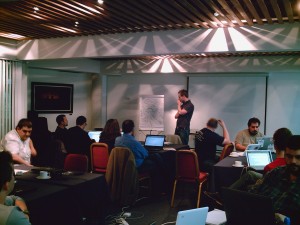Learn more
- Sep 27, 2008
Looking back at a successful VoCamp Oxford
(by Matthias Samwald)
The first VoCamp ever was successfully completed this week at Oxford University. Tom Heath (Talis) and Jun Zhao (Oxford University) led us through two days devoted to creating new vocabularies, schemas and ontologies. The first day was mainly spent on finding common interests, getting to know each other, and identifying the vocabularies that needed to be created. The second day was spent on creating the vocabularies, first on paper, then on the computer.
Fabien Gandon introduced me to his interesting work around corporate ontologies, which I will explore in further detail for the KiWi project. We also made significant progress on developing a basic, common ontology for the representation of agreement, disagreement and discourse, based on SIOC, SCOT, FOAF and the bibliographic ontology. Such an ontology can be of great utility in many knowledge domains, such as biomedical research or the representation of bug/issue reports in software development knowledge management (something that needs to be adressed for adapting the KiWi system for a use-case at Sun Microsystems). I will elaborate on these developments in separate blog posts next week.
In a very short timespan, the participants of the VoCamp created several new vocabularies, such as:
Participation Ontologies
UDO (Unified Discourse Ontology)
VotePost
Evidence ontology
Whisky Ontology (yes, it’s an ontology about whiskey)
Journey Ontology
Data publishing, sharing, visualisation ontology
On the second day of the VoCamp I also held a short session called „Do OpenCyc and UMBEL know it?“, where I asked for classes and properties that others wanted to create in their developing vocabularies. It turned out that OpenCyc and UMBEL had a relatively good coverage of the terms that others were creating, including whiskey, evidence, or the relation that one person is the boss of another person (relevant for the corporate Semantic Web). I tried to emphasize that linking and re-using such existing entities was vital for the success of new vocabularies, and of the Semantic Web as a whole. Others objected that re-using such existing resources might not be possible given the often very specific requirements and short time-frames of some projects. Still, I think that linking to existing, large resources on the Semantic Web should have a very high priority when developing new vocabularies.
If you are interested in getting new vocabularies out, but did not get the chance to attend VoCamp Oxford: don’t worry, there are many VoCamps planned for the near future. The next VoCamp will already happen in November, and will be located at DERI Galway. The Semantic Web Company will host a VoCamp in Vienna next year.
